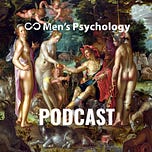Welcome to a series of videos that will introduce you to a simple model of men’s psychology that draws on some of the growing body of research on men.
There’s more than meets the eye with men, just as there is with women. Men are driven at the core by instincts the same as women—masculine instincts.
However, just like women, they have emotions of very similar types and style. The expression is different because emoting is in some part, governed by the instincts.
Finally, the intellect and mature executive functions are also just like those of women (we have identical IQ potential - and “EQ” potential.) Yet the masculine instincts also influence that, and our communication and behavior.
This synthesis of the old and new, the rigorous and the elegant, and most important of all, an attempt at “unification of the psychologies” is the aim of Masculine Psychology, as we start to discuss in this first video.
It’s Masculine Psychology (originally, MMP), which is available in videos delivered one day at a time, for the full 5+ hours of the course (available to paid subscribers only)…
Upgraded Members get full access to the full program and many others from Men’s Psychology right away without waiting for lesson-by-lesson:
SUMMARY
Dr. Paul discusses the relationship between money, power, and personal freedom, challenging common perceptions about wealth and morality. Key points include:
1. **Power and Money**: The speaker suggests that increased financial success leads to greater freedom and power. However, they note that many associate power and wealth with negative connotations, citing phrases like "money is the root of all evil."
2. **Correcting Misconceptions**: The speaker clarifies that it is the "love of money" or an addiction to it that leads to negative outcomes, not money itself. They argue that money can enable individuals to do good for others and support their loved ones.
3. **Personal Reflection**: The speaker shares a personal anecdote about their father's negative beliefs regarding money and wealth, which contributed to their family's impoverished status. This inherited mindset about the morality of wealth was framed as a damaging legacy.
4. **Cultural References**: The speaker introduces Odysseus, a symbol of adventure and masculinity, as an archetype representing personal growth and exploration. They connect Odysseus to the idea of maturity and the potential for men to venture out into the world.
5. **Generational Legacy**: The speaker reflects on the struggles of previous generations, drawing parallels between the myth of Sisyphus—who is condemned to futile labor—and the working-class fathers who sacrificed for their children to have opportunities. These paternal figures worked hard to provide their children with the freedom to pursue their dreams.
Overall, the discussion aims to reframe the understanding of wealth and power, emphasizing that they can be tools for good when approached with a mature mindset. It underscores the importance of overcoming inherited negative beliefs about money and embracing its potential to foster personal freedom and adventure.













Share this post